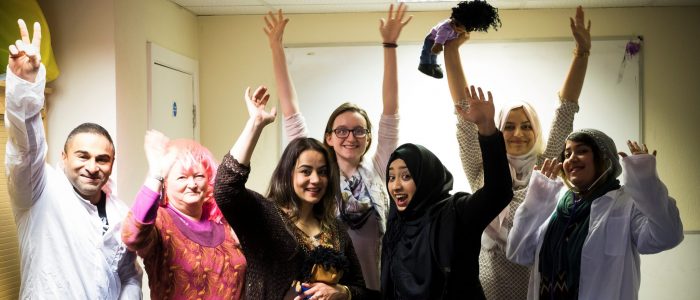Celebrating Volunteers: ‘reaching the parts nothing else can’

I am hugely proud and privileged to have the opportunity to work with amazing volunteers across the country who are delivering the Creative English programme in their communities. In this role, I’ve been lucky enough to travel round the country, seeing the amazing work that volunteers are doing in Creative English, but also in wider roles in their faith and community settings. In the last two weeks, for example: in London, I met a volunteer freshly back from attending appointments at a child’s school to support a vulnerable mum; in Luton, I saw volunteers encourage a woman in applying strategies to dealing with challenging behaviour from her child; in Birmingham, a volunteer provided access to a phone for someone whose benefits had mysteriously stopped; in Bradford, volunteers fed anyone in need of a meal; in Northampton, a volunteer patiently followed up a homeless man helping him take steps towards work; in Bristol, a volunteer continued with a project, even though a lack of funding meant her paid role has disappeared. The list could go on and on…
Wow! Volunteers are amazing people: not only for the time and energy they give to support others, but for their capacity to offer the friendship and flexibility to meet individual needs that no professional service ever can. For Creative English, Coventry University highlighted the effort facilitators make to ensure people feel welcome precisely because they are volunteers and are there purely for altruistic reasons. This level of care is reflected in all sorts of volunteer-led projects. Volunteering is particularly characteristic of people of faith. DEMOS (2012) found people who belong to a religious organisation are six times more likely to volunteer than those who do not. The Cinnamon Faith Action Audit (2015) estimated that the time given by churches and other faith groups to their communities through social action projects was worth over £3 billion a year.
Small gestures of care have a huge impact on individuals. A culture of entitlement, for example, can be broken by the genuine relationship often offered by volunteers, who are willing to support people by facing challenges alongside them rather than simply doing things for them. This sort of care is then often replicated in the future by those who have experienced it. Those who have experienced challenges are often well equipped to support others facing similar circumstances when they’ve passed through to the other side. Volunteers will sometimes tell me that they “don’t do anything much” in a project, when you can see within minutes they are having a huge impact simply by being friendly and welcoming to people who would not naturally feel at ease.
So, this Volunteers Week, I’d like to say a huge thank you to all the volunteers who support others, whatever your role. The impact you have on people’s lives is extraordinary!



